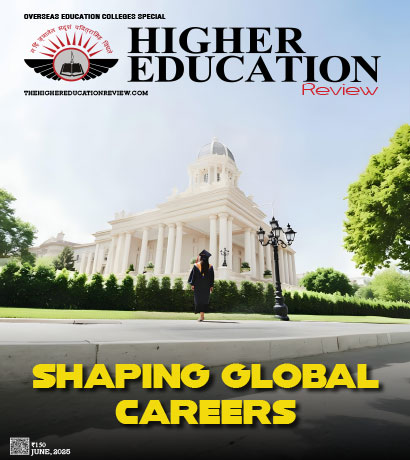The Role of Universities in Workforce Development and Skills Training
 Prof Parimal Mandke has been an educator for over 40 years and brings this vast knowledge and experience to ably manage the affairs of NIIT University as its Vice-President. Prof Mandke has a double masters’ degree, having first done her MSc from Bombay University and then acquired an MSc (Tech) from BITS, Pilani. She followed this up with a PhD from BITS, Pilani.
Prof Parimal Mandke has been an educator for over 40 years and brings this vast knowledge and experience to ably manage the affairs of NIIT University as its Vice-President. Prof Mandke has a double masters’ degree, having first done her MSc from Bombay University and then acquired an MSc (Tech) from BITS, Pilani. She followed this up with a PhD from BITS, Pilani.
With rapid technological changes and shifting job market demands, universities are no longer just the centres of academic learning. Their role has expanded to include workforce development and practical skills training too. This shift presents both a challenge and an opportunity as institutions adjust to the new expectations from students, employers, and policymakers. Earlier, universities have focused on theoretical knowledge, critical thinking, and broad intellectual development. While these remain essential, today’s job market demands more. Employers often struggle to find candidates with the right skills that are required for this ever-evolving economy globally, leading to a noticeable "skills gap." To address this, universities are collaborating with industries to design their curricula that align with the workforce needs.
Hands-on learning experiences that simulate real-world work environments
Beyond classroom instruction, universities are increasingly emphasizing upon hands-on learning experiences that simulate real-world work environments. These include internships campus-based entrepreneurship incubators and innovation labs, service-learning projects that address community needs while building practical skills, and industry-specific simulations and case competitions. Students who participate in multiple high-impact experiential learning opportunities during their academic careers demonstrate greater career readiness and report smoother transitions into the workforce. The traditional four-year degree remains valuable, but universities are expanding their offerings to include more flexible credentialing options. Digital badges, and stackable certificates today, also allow students to demonstrate specific competencies to employers while potentially building toward their degree.
As automation, artificial intelligence, and globalization continue to reshape industries, universities must ensure that graduates are not only technically proficient but also adaptable to shifts in the job market. The rapid pace of change means that traditional career trajectories are becoming less predictable, requiring professionals to be lifelong learners who can continuously acquire new skills. Universities play a key role in fostering this adaptability by encouraging critical thinking, problem-solving, and a willingness to embrace new technologies. Institutions that integrate emerging fields such as data science, cybersecurity, renewable energy, and digital marketing into their programmes provide students with a competitive edge in the job market.
Collaboration between universities and industries is becoming more structured, with companies actively participating in curriculum development and offering hands-on learning opportunities. Many institutions now co-design courses with corporate partners, ensuring that the skills that are taught align with real-world applications. Joint research initiatives between universities and businesses also contribute to innovation, helping to develop new products, services, and business models that fuel economic growth. Moreover, guest lectures, corporate mentorship programmes, and industry-sponsored projects allow students to interact with professionals who can offer insights into workplace expectations and career advancement strategies.
With the rise of the gig economy and the increasing number of freelance and contract-based roles, students need skills that go beyond traditional employment models. Universities are equipping students with entrepreneurial knowledge, helping them understand business fundamentals, financial management, and market trends. Startup incubation centres provide aspiring entrepreneurs with mentorship, funding opportunities, and networking resources, allowing them to turn innovative ideas into viable business ventures. By fostering an entrepreneurial mindset, universities contribute not only to individual career success but also to broader economic development.
International partnerships for global career opportunities
Globalization has further expanded the scope of workforce development in higher education. Many universities are establishing international partnerships that enable students to gain global perspectives and access career opportunities beyond their home countries. Study-abroad programmes, virtual exchange courses, and cross-border research collaborations prepare students for careers in multinational corporations and global industries. Exposure to diverse work cultures and business environments enhances the ability of students to navigate international markets, fostering a workforce that is both globally aware and locally effective.
As the nature of employment continues to evolve, universities must also focus on inclusivity in workforce development. Ensuring that students from diverse backgrounds have access to the same career-building opportunities is critical to reduce inequalities in the job market.
One effective approach is to incorporate more personalized learning pathways that cater to different learning styles, financial situations, and career aspirations. Universities can leverage technology to offer adaptive learning platforms, where students can progress at their own pace and gain industry-relevant skills through online modules, virtual simulations, and real-world projects. Additionally, expanding access to career counselling and mentorship programmes ensures that students, particularly those from disadvantaged backgrounds, receive the guidance they need to navigate their professional journeys.
Conclusion
Looking ahead, universities must remain agile and responsive to the needs of both students and employers. Institutions that embrace innovation, industry collaboration, and lifelong learning will play a critical role in shaping the future of work. By fostering an ecosystem that prioritizes skill development, adaptability, and real-world experience, universities can continue to bridge the gap between education and employment, ensuring that graduates are prepared not just for their first job, but for a lifetime of career evolution and growth.

